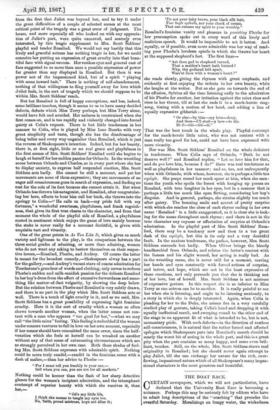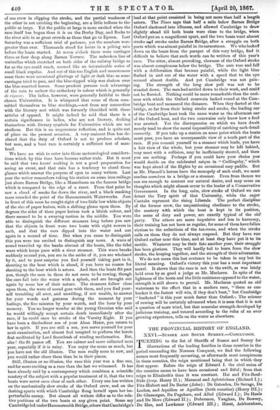THE BOAT RACE.
CERTAIN newspapers, which we will not particularize, have declared that the University Boat Race is becoming a nuisance. Perhaps this may be seriously felt by editors who have to admit long descriptions of the "coaching" that precedes the eventful Saturday. Moralizings on lumpy water, the wickedness of one crew in clipping the stroke, and the partial weakness of the other in not catching the beginning, are a little tedious to the public at large. Yet the public at large is more excited when the race itself has begun than it is on the Derby Day, and flocks to the river side in as great crowds as those that go to Epsom. Last Saturday was a sufficient trial of patience, yet the numbers were greater than ever. Thousands stood for hours in a pelting rain before the boats started. At seven o'clock there were carriages three or four deep along Barnes Terrace. The unbroken line of umbrellas which stretched on both sides of the railway bridge as far as the eye could reach, seemed like an interminable series of small black cupolas. And out of this too English and monotonous mass there were occasional glintings of light or dark blue as some carriages tried to pass, and the blue-tipped whip was shaken over the blue-rosetted horses. Some prudent persons took advantage of the rain to eschew the orthodoxy in colour which is generally de rigueur. The ladies, however, were generally faithful to their chosen Universities. It is whispered that some of them com- mitted themselves to blue stockings,—not from any connection with the literary sect which was formerly identified with those articles of apparel. It might indeed be said that there is a certain significance in ladies, who are not literary, decking themselves with literary symbols for Universities which are not studious. But this is an ungenerous reflection, and is quite out of place on the present occasion. A very eminent Don has de- clared that the duty of Oxford is not to produce scholars, but men, and a boat race is certainly a sufficient test of man- hood.
We have no wish to enter into those meteorological considera- tions which by this time have become rather stale. But it must be said that two hours' soaking is not a good preparation for seeing an event, and that rain has a tendency to cloud -those glasses which answer the purpose of eyes to many writers. Last year the writer remembers taking his station on some iron railings just above Barnes Bridge, like a Mussulman on the famous bridge which is compared to the edge of a razor. From that point he saw a cloud of smoke far down the river, and a black smoking mass rounded the point of the Hammersmith Waterworks. Just in front of this mass he caught sight of two little low white objects of the size of paper knives, with a shifting gleam upon them. By degrees the sides of these paper knives took a bluish colour, and there seemed to be a swaying motion in the middle. You were able to distinguish the different steamers long before you saw that the objects in front were two boats with eight rowers in each, and that the oars dipped into the water and out again in a second of time. But when you came to distinguish this you were too excited to distinguish any more. A wave of sound travelled up the banks abreast of the boats, like the tidal wave which keeps pace with a river steamer. This wave breaks suddenly around you, you are in the midst of it, you are whelmed by it, and to your surprise you find yourself taking part in it, shouting to the boat which is ahead, if you have no reason for shouting to the boat which is astern. And then the boats flit past you, though the men in them do not seem to be rowing, though the oars fall into the water with a splash, and are brought out again by some law of their nature. The steamers follow close upon them, the wave of sound goes with them, and you find your- self trembling all over, and unwilling, if not unable, to answer for your words and gestures during the moment by your feelings, the five minutes by your watch, and the hour by your memory. You no longer wonder at the young Oxonian who said he would willingly accept certain death immediately after the race, if he could once be stroke of the 'Varsity Eight. If you have been a disobedient son of your Alma Mater, you return to her in spirit. If you are still a son, you nerve yourself for your next examination, and almost feel tempted to perform the heroic feat meditated by Lord Scoutbush of reading mathematics. But, alas ! the fit passes off. You are calmer and more collected next year, especially if it is rainy. You enjoy the scene as much, but you have not the old illusion. The men really seem to row, and you would rather cheer them than be in their places.
Still, illusion or no illusion, the race this year was a fine one, and far more exciting as a race than the last we witnessed. It has been already said by a contemporary which combines a scientific mastery of the subject with a popular treatment of it, that the two boats were never once clear of each other. Every one has written on the mechanically slow stroke of the Oxford crew, and on the dashing spurts with which Cambridge flung herself upon her im- perturbable enemy. But almost all writers differ as to the rela- tive positions of the two boats at any given point. Some say Cambridgeled under Hammersmith Bridge, others thatCambridge's
lead at that point consisted in being not more than half a length astern. The Times says that half a mile below Barnes Bridge Oxford slackened into idleness, and allowed Cambridge to draw slightly ahead till both boats were close to the bridge, when Oxford put on a magnificent spurt, and the two boats went almost stroke aad stroke under Barnes Bridge, after a struggle on both parts which was almost painful in its earnestness. We who looked down on the boats from the parapet of this very bridge, find it difficult to believe that such words can be written of this year's race. The utter, almost provoking, slowness of the Oxford stroke was almost conspicuous below the bridge. The oars rose and felt with a deliberation that became painful, while the light blue flashed in and out of the water with a speed that to the eye seemed almost double. And yet Cambridge was not gain- ing. The strength of the long slow pull was not to be wearied down. The men had settled down to their work, and could not be flurried. Nothing could be more remarkable than the cool- ness with which the Oxford coxswain looked round at the Cam- bridge boat and measured the distance. When they darted at-the bridge, so far from their being stroke and stroke, the leading car- d the Cambridge boat took the same water as the aftermost oar- of the Oxford boat, and the two coxswains only know how a foul was averted. Yet the discrepancies on which we have dwelt merely tend to show the moral impossibility of catching each detail correctly. If you take up a station on some point which the boats- must pass, you have an unsurpassable view of a tenth part of the race. If you commit yourself to a steamer which leads, you have a fair view of the whole, but your steamer may be left behind,. may meet with a collision, may be inefficiently steered, and them you see nothing. Perhaps if you could have your choice yotr would decide on the celebrated caique in " Codlingsby," which was kept ahead of the Eights by an occasional easy paddle. But as Mr. Disraeli's heroes have the monopoly of such craft, we must confine ourselves to a bridge or a steamer. Even from thence we- can see enough to content our natural desire, and may muse on- thoughts which might almost occur to the leader of a Conservative Government. In the long, calm, slow stroke of Oxford we can- detect the Tory spirit of that University, while the eager Cantabs represent the rising Liberals. The perfect discipline. of the former crew, the unquestioning obedience to the stroke, the mastery with which the boat is kept in its position, the sense of duty and power, are exactly typical of the old! party. The others are more impulsive and less in harmony, their training has not been as regular, for some of them have fallen• victims to the seductions of the tea-room, and when the stroke calls on them they do not always respond. But they have run- Oxford rather near this time, and at least they have put it to its mettle. Whatever may be their fate another year, their struggle- has been glorious. They will hardly fail to learn from the slow- stroke, the keeping together, and the strength of their adversaries.
We do not mean this last sentence to be taken in any but its- literal meaning. Oxford's victory this year has a most important- moral. It shows that the race is not to the swift, as was lately held even by so good a judge as Mr. Maclaren. In spite of the lightness of the boats and the little resistance opposed to the water, strength is still shown to prevail. Mr. Maclaren quoted an old- Waterman to the effect that in a modern race, " them as can. bucket it the fastest will win, if they don't bust," but Cambridge- " bucketed " it this year much faster than Oxfordea The science- of rowing will be certainly advanced when it is seen that it is not- a question of mere wind, but that muscular strength developed by judicious training, and tutored according to the rules of an ever- growing experience, tells on the water as elsewhere.































 Previous page
Previous page